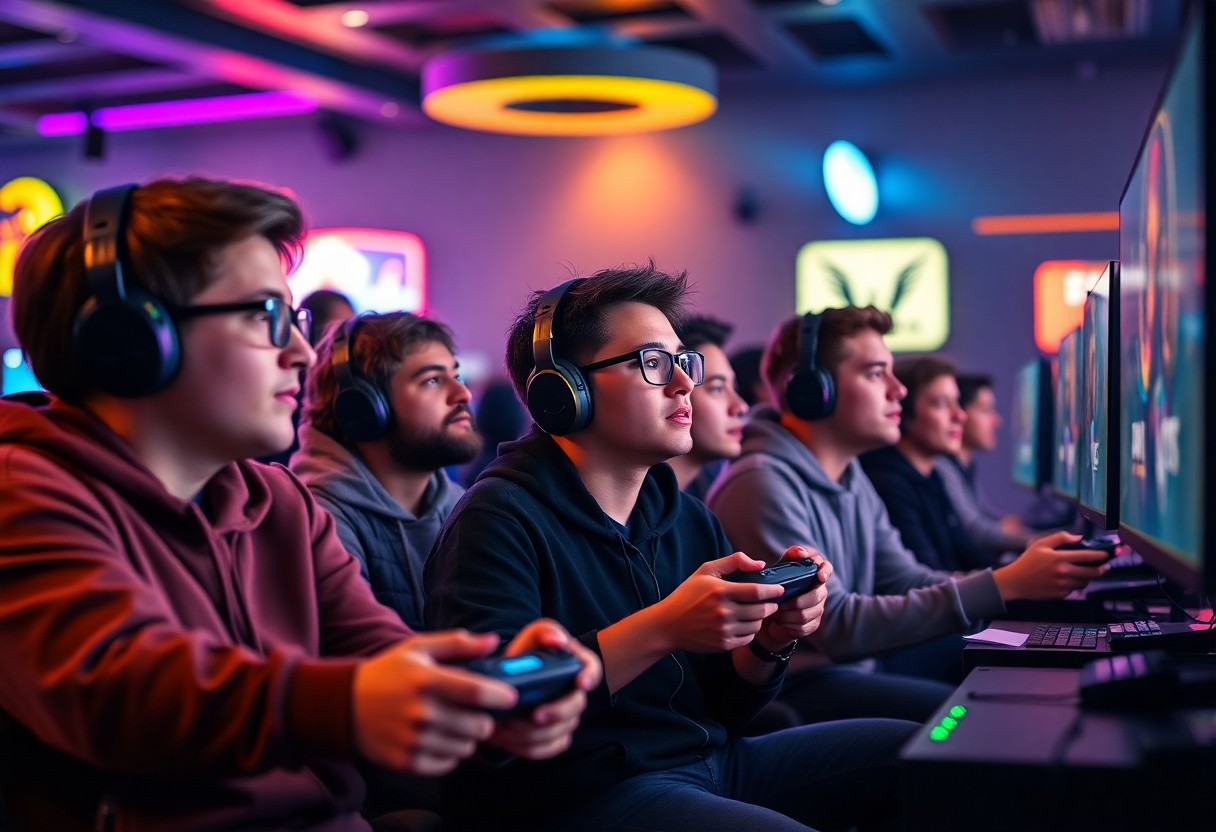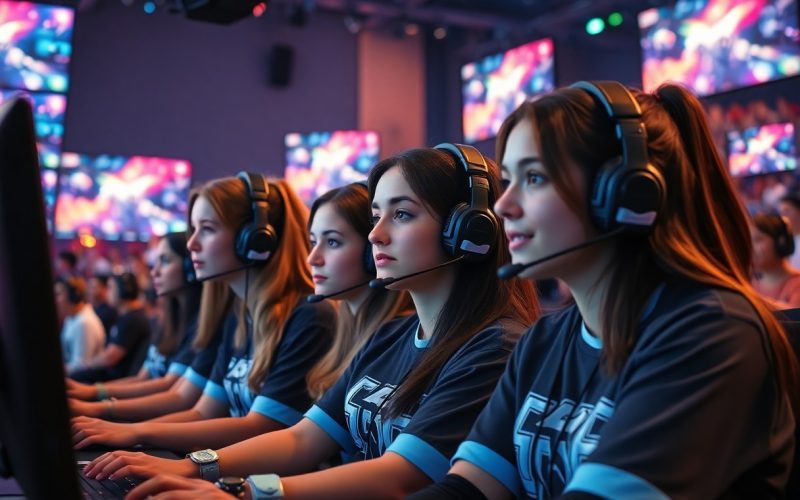Professional gaming has rapidly evolved into a viable career path, sparking a debate about whether casual gamers can make the leap to professional status. With the increasing accessibility of competitive gaming through online platforms and esports tournaments, many casual players wonder if they possess the potential to compete at higher levels. This post explores the transformative journey from casual play to professional competition, examining the skills required, the mindset needed, and the resources available for those aspiring to elevate their gaming experience.
Understanding Casual Gaming
To comprehend the world of gaming, it is crucial to differentiate between various types of players and their engagement levels. Casual gaming has seen a surge in popularity, with countless individuals indulging in games for fun and relaxation rather than competition. This sector often encompasses simple mobile games, social platforms, and family-friendly titles that allow players to engage without a hefty time commitment. These players typically enjoy gaming in short bursts, prioritizing convenience and entertainment over skill development or dedication to a particular game.
Definition of Casual Gamers
After entering into the expansive world of gaming, it becomes clear that casual gamers represent a significant portion of the gaming community. These individuals engage with games that require minimal commitment, often participating in short sessions that fit seamlessly into their daily lives. Whether it’s a quick puzzle game on their smartphone or a friendly round of Mario Kart with friends, casual gamers seek enjoyable experiences rather than extensive gameplay knowledge or mastery of complex strategies. This broad definition captures a diverse audience that values enjoyment over intense competition.
Differences Between Casual and Competitive Gaming
Behind the casual gaming experience lies a stark contrast with competitive gaming, also known as esports. Competitive gamers often invest countless hours in refining their skills, understanding game mechanics, and developing strategies to excel in high-stakes environments. While casual gamers may play for enjoyment, competitive gamers are driven by the desire to succeed, often participating in tournaments or ranking systems. The stakes are considerably higher in competitive gaming, representing a drastic shift from the relaxed atmosphere that defines casual gaming.
Between the realms of casual and competitive gaming, one can observe significant variations in motivation, skill development, and overall engagement. Casual gamers tend to prioritize enjoyment, while competitive gamers have a clearly defined goal of mastery and success in specific titles. This divide shapes the way players approach their gaming experiences, as competitive players often dedicate substantial time and resources towards improving their performance in a way that casual gamers typically do not. Understanding these distinctions is crucial for evaluating whether casual gamers can transition to professional play.
The Rise of Esports
Now, the evolution of esports from a niche enthusiast community to a mainstream phenomenon has been nothing short of remarkable. The term “esports” encapsulates competitive gaming where players team up or compete against each other in organized tournaments, often with substantial cash prizes. As the audience for these events has expanded, so too has the investment from sponsors, media outlets, and even traditional sports franchises. Major competitions fill arenas with thousands of spectators, and online viewership on platforms like Twitch has skyrocketed, demonstrating that esports have firmly established their place in the entertainment landscape.
Growth of the Competitive Gaming Industry
Beside this remarkable increase in viewership, the competitive gaming industry has seen exponential growth in both the variety of games and the platforms that support them. Titles such as League of Legends, Dota 2, and Counter-Strike: Global Offensive have not only set benchmarks for competitive play but have also cultivated dedicated fan bases that contribute to their ongoing popularity. Investment in player development, professional leagues, and collegiate teams has redefined the landscape, making competitive gaming a viable career for skilled players. As the market continues to mature, more stakeholders are joining, enhancing the ecosystem that supports both amateur and professional players.
Opportunities for Casual Gamers
Competitive gaming offers exciting pathways for casual gamers who aspire to elevate their skills and potentially turn their passion into a professional endeavor. Many gaming titles now provide versatile access points, making it easier for players to transition from casual to competitive formats. While some games feature tournaments tailored to casual players, others have skill-based matchmaking systems, allowing casual gamers to compete against opponents of similar skill levels—a critical factor when trying to improve and gain confidence in one’s abilities.
A gaming community fostering inclusiveness and support has emerged, which provides resources such as guides, forums, and online coaching for casual gamers seeking to refine their skills. This, combined with the growth of amateur tournaments and local events, creates numerous opportunities for casual players to showcase their talents, meet like-minded individuals, and gain invaluable experience. As the esports ecosystem becomes more robust and entrenched, it offers even more avenues for aspiring players to try out for teams, gain sponsorship deals, or participate in live events, ultimately enabling them to chase their dreams of going pro.
Skill Development for Casual Gamers
Some casual gamers may initially feel daunted by the prospect of transitioning to a professional level, but skill development is entirely feasible. With a committed approach and the right resources, they can enhance their gaming abilities significantly. Identifying personal strengths and weaknesses becomes the first step, allowing individuals to focus on specific areas for improvement. This could be anything from reaction time and strategic thinking to map awareness and character selection. Setting regular practice schedules, engaging with tutorials, and seeking feedback from more experienced players can also prove to be effective strategies in refining one’s skill set.
Enhancing Game Mechanics
Across various gaming genres, mechanics form the backbone of gameplay, dictating how players interact with their environment and opponents. For casual gamers aspiring for professional status, it’s necessary to develop a deep understanding of the mechanics pertinent to their chosen game. This might include mastering controls, learning effective timing for actions, and understanding the in-game physics that contribute to success. Training sessions focused on specific mechanics, coupled with targeted exercises and challenges, will help reinforce these skills and transform instinctual responses into deliberate tactics.
Learning Strategies and Team Play
About transitioning to a more competitive scene, learning strategies and team play becomes vital. Casual gamers should invest time in studying both the meta-game and individual strategies that can elevate their performance. This involves understanding game theory, positioning and when to engage in aggressive or defensive play. Team dynamics are equally important; fostering good communication and coordination with teammates can enhance overall effectiveness in matches. Additionally, analyzing gameplay footage can provide insights into not only one’s performance but also that of successful teams, allowing for a better understanding of advanced strategies.
And as players research into team play, developing synergistic strategies is necessary for long-term success. The nuances of coordinating with teammates can exhibit a considerable impact on game outcomes. Collaborating on tactics, practicing specific roles, and establishing clear communication methods will set a solid foundation for teamwork. By fostering an environment of adaptability and support, casual gamers can bolster their performances, preparing them for the nuances of competitive gaming while also enhancing their overall enjoyment of the game.
Transitioning from Casual to Pro
Despite the challenges that come with making the leap from casual to professional gaming, it is certainly achievable for those willing to put in the effort and commitment. This transformation requires a dedicated approach to skill improvement, time management, and a deep understanding of the gaming ecosystem. By developing a structured practice routine and honing gameplay mechanics, transitioning casual gamers can enhance their skills and position themselves for success in the competitive arena.
Identifying the Right Game
Behind every successful professional gamer, there is a strategic choice in the game they decide to focus on. Not all games provide equal opportunities for growth and competition; some have more significant professional infrastructures, including tournaments, sponsorships, and community support. It is imperative for aspiring professionals to select a title that not only aligns with their interests and strengths but also has a thriving competitive scene. Titles such as League of Legends, Dota 2, and Fortnite have proven to be viable stepping stones for many skilled gamers, thanks to their established eSports ecosystems.
Building a Personal Brand and Reputation
Personal branding is an integral part of the journey to becoming a professional gamer. By establishing a recognizable brand, gamers can attract sponsors, followers, and opportunities. A strong online presence through streaming platforms, social media, and content creation helps to craft a unique identity that resonates with potential audiences and sponsors. Developing a consistent game style, communication approach, and visual identity aids in bolstering one’s reputation within the gaming community.
To build a personal brand effectively, aspiring professionals should engage with their audience regularly, showcasing not only their gaming skills but also their personality. Interacting with followers, sharing gameplay insights, and participating in gaming discussions can create a loyal fanbase. By staying active on multiple platforms and producing consistent content, gamers can position themselves as credible figures within their chosen community, paving the way for opportunities to collaborate with brands and leverage their reputation for professional growth.
Challenges Faced by Aspiring Pro Gamers
Once again, the journey of an aspiring pro gamer is fraught with various challenges that can deter even the most passionate individuals. While casual gamers may possess the foundational skills required for gaming, transitioning to a professional level demands more than just enthusiasm. The gaming industry is fiercely competitive, with thousands of talented players vying for limited spots in professional teams. Understanding the myriad challenges one must navigate is necessary for anyone considering this path.
Time Commitment and Sacrifices
Along the journey to becoming a professional gamer, one of the most significant hurdles is the immense time commitment required. Casual gamers often have flexible schedules that allow for occasional play, but aspiring pros must devote countless hours to training, practice, and improvement. This level of dedication often necessitates sacrifices and adjustments in other areas of life, including social interactions, education, or even employment. As aspiring pros immerse themselves in the competitive landscape, they find that their leisure activities can diminish significantly.
Dealing with Competition and Burnout
Among the challenges faced by those vying for pro status are the pressures of competition and the risk of burnout. The competitive gaming environment is not only intense but also emotionally demanding, as players constantly measure their skills against others who are equally ambitious. This ongoing battle for recognition can lead to extreme pressure, which, if not managed effectively, may result in mental fatigue and disengagement. Many players find themselves struggling to maintain motivation and enthusiasm for the game, leading to decreased performance or even withdrawal from gaming altogether.
Consequently, aspiring pro gamers must develop effective coping mechanisms to navigate the highs and lows of competition while avoiding burnout. Balancing practice schedules with adequate breaks, establishing a support system among fellow gamers, and prioritizing mental health are vital strategies for sustaining long-term engagement in the gaming arena. Without addressing these issues, the dream of going pro can quickly become a source of stress rather than fulfillment. Understanding these challenges and how to manage them is imperative for anyone looking to transition from casual gaming to a professional career.
Success Stories of Casual Gamers Going Pro
All around the gaming community, there are inspiring tales of casual gamers who have successfully made the transition to professional gaming. These individuals prove that passion and dedication can lead to extraordinary achievements, often turning a hobby into a lucrative career. Many aspiring professional gamers can draw inspiration from their stories, as they highlight the potential that exists within every player who loves to engage in gaming, regardless of their prior experience or background. Their journeys remind us that the world of esports is vast, allowing casual players to find their niche and thrive.
Notable Examples
Above all, there are notable examples that stand out. One of the most prominent figures is Tyler “Ninja” Blevins, who began his gaming career in casual environments before becoming a household name in esports and streaming. His rise to fame started with playing first-person shooters and transitioned to multiplayer battle royale games, where he not only showcased his amazing skills but also captivated audiences with his engaging personality. Other examples include players like Seth “Scump” Abner and Ali “Myth” Kabbani, who transitioned from casual play into competitive environments, earning accolades, sponsorships, and respect within the gaming community.
Lessons Learned from Their Journeys
At the heart of these success stories lie valuable lessons for aspiring professionals. These gamers emphasize the importance of consistent practice, the willingness to adapt to new game mechanics, and the critical need for mental resilience in high-pressure situations. Additionally, they highlight how building a personal brand and engaging with the gaming community can enhance visibility and opportunities, paving the way for a successful streaming or competitive career.
Success in the transition from casual to pro gaming often depends on a mix of skill development and networking. Many of these players underscore the significance of participating in local tournaments and online competitions, which helps them gain exposure and polish their skills. Furthermore, dedication to improving gameplay and fostering positive relationships within the community can open doors to collaborations and sponsorships, enhancing an individual’s profile in the competitive gaming landscape. Ultimately, these journeys convey that with the right mindset and approach, casual gamers can find success at a professional level.
Final Words
On the whole, the transition from casual gamer to professional player is not impossible, but it requires dedication, commitment, and a strategic approach. Casual gamers who aspire to go pro should start by identifying their strengths within particular games and then focus on improving their skills through consistent practice. Additionally, engaging with the gaming community, seeking mentorship, and participating in local or online tournaments can provide valuable experience and exposure. Such opportunities not only enhance gameplay but also open doors to networking, which can be vital in the competitive eSports environment.
Moreover, potential pro gamers should be aware of the evolving landscape of competitive gaming. With the rise of various eSports leagues and platforms, opportunities are increasingly available for those willing to put in the effort. Balancing gaming with personal responsibilities and self-care is crucial, as the journey can be demanding. Ultimately, while the pathway from casual gamer to pro is filled with challenges, those who are passionate and dedicated to their craft can certainly find success in this exciting field.






